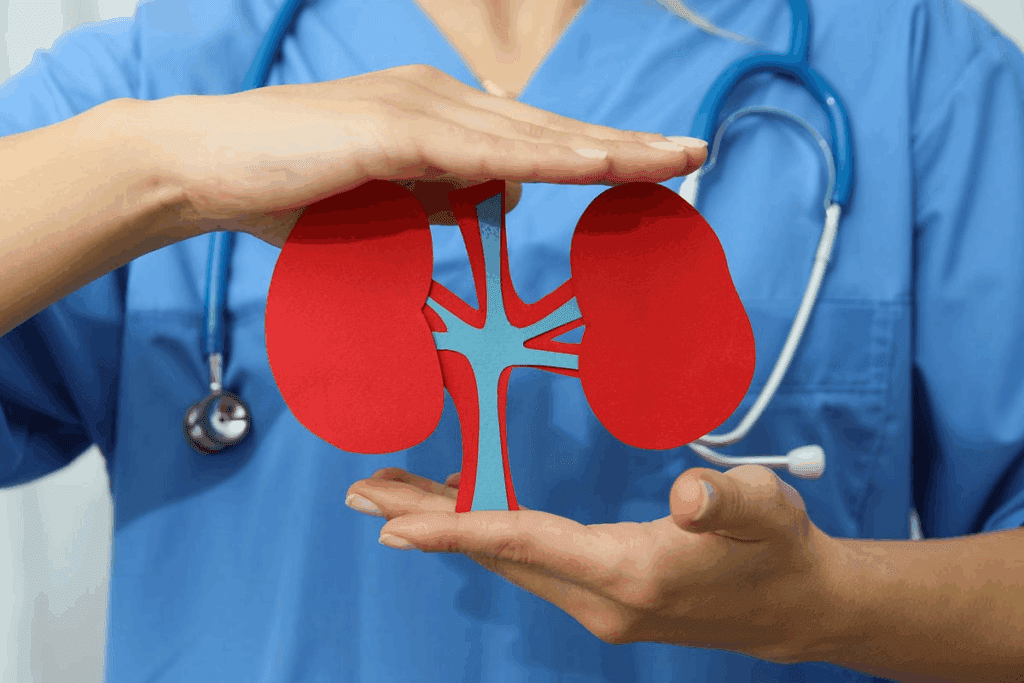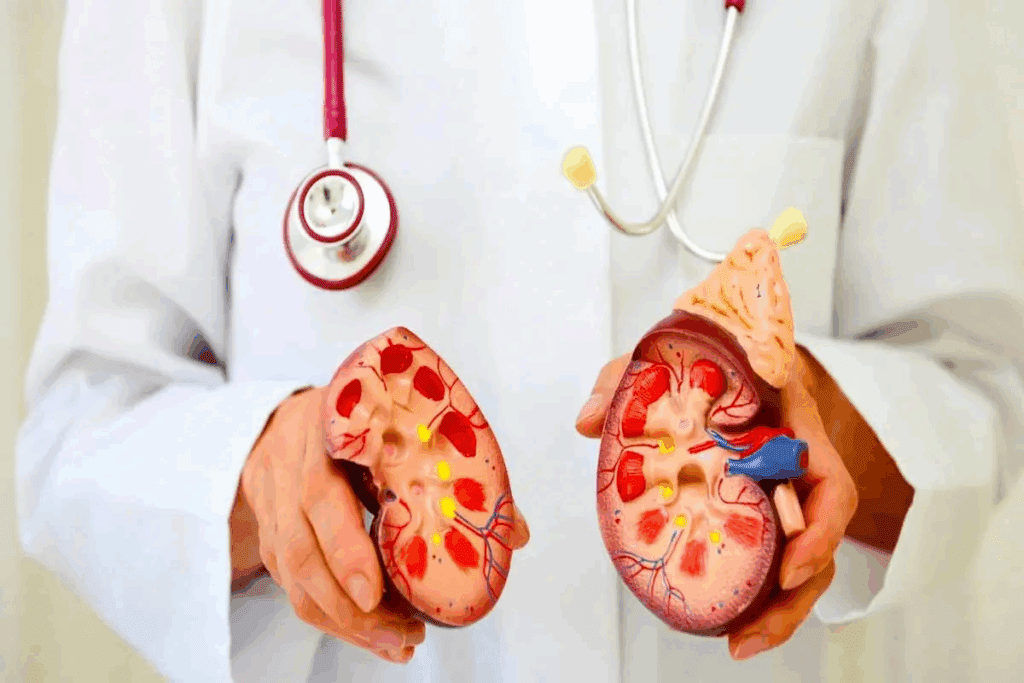
The link between calcium intake and kidney stone formation is often confused. Many think a high calcium diet raises the risk of kidney stones. But studies show the opposite: a moderate to high calcium diet can lower the risk of kidney stones
does too much calcium cause kidney stones.
Most kidney stones are made of calcium. Yet, a high calcium intake alone doesn’t usually cause them. In fact, a low calcium diet can increase the risk, more so with foods high in oxalate like beets and almonds.
At Liv Hospital, we focus on the patient in managing kidney stone risk. Our team works with patients to create diet plans that fit their needs and health.
Key Takeaways
- A high calcium diet does not inherently cause kidney stones.
- Research shows an inverse relationship between dietary calcium intake and stone formation risk.
- A low calcium diet can increase kidney stone risk, specially with oxalate-rich foods.
- Liv Hospital’s patient-centered approach helps manage kidney stone risk.
- Personalized dietary plans are developed based on individual patient needs.
The Calcium-Kidney Stone Misconception

For years, doctors thought too much calcium caused kidney stones. About 80-90 percent of stones are calcium oxalate or calcium phosphate. This led to the idea that less calcium would stop stones.
Kidney stones often form when calcium and oxalate combine. This happens when there’s too much of these in your urine. Knowing how stones form helps clear up the calcium myth.
Origins of the Calcium Restriction Theory
The idea to limit calcium came from seeing calcium in many stones. Early studies thought less calcium would help. But, this theory is too simple for the complex stone-making process.
Why This Misconception Persists in Medical Advice
Despite new evidence, some doctors keep telling people to limit calcium. This is because:
- They might not know about the latest research.
- They might not understand how calcium affects stones.
- They worry about the dangers of too much calcium.
Looking closer, we see calcium’s role in stones is more complex. Here’s a summary of what we know:
| Calcium Intake Level | Kidney Stone Risk |
| Low (<600mg/day) | Increased risk due to higher oxalate absorption |
| Moderate (600-1200mg/day) | Optimal balance reducing stone risk |
| High (>1200mg/day) | No significant additional benefit; possible risks |
By grasping the details of calcium’s role in stones, we can give better advice. This helps prevent these painful issues.
Understanding Kidney Stone Formation

It’s important to know how kidney stones form to prevent and treat them. Kidney stones are hard deposits made of minerals and salts. They form inside the kidneys due to various factors and substances in the urine.
The Process of Stone Development
Kidney stones form when urine has more crystal-forming substances than it can dilute. These substances include calcium oxalate, calcium phosphate, and uric acid. This imbalance causes crystals to form, which then grow into stones.
“The supersaturation of urine with stone-forming salts is a critical step in the development of kidney stones,” experts say. This happens when the concentration of these salts is higher than their solubility in urine.
Supersaturation and Crystal Formation
Supersaturation occurs when urine has more dissolved minerals than it can hold. This leads to minerals precipitating out of solution, forming crystals. Over time, these crystals can grow into kidney stones.
Where Kidney Stones Form in the Kidney
Kidney stones usually form in the renal pelvis. This is the part of the kidney that collects and passes urine to the ureter. Stones can also form in the calyces, which collect urine from the renal tissue. Sometimes, stones are painless until they move into the ureter, causing severe pain.
The location of stone formation affects symptoms and severity. For example, stones in the renal pelvis might not cause pain until they move.
Types of Kidney Stones and Their Composition
Understanding kidney stones is important. They are not just one thing but many types. Each type has its own causes and ways to prevent them.
Calcium Oxalate Stones
Calcium oxalate stones are the most common, making up about 80% of cases. They form when calcium and oxalate mix in urine. Too much oxalate in food, certain health issues, and not enough calcium can cause them.
Calcium Phosphate Stones
Calcium phosphate stones also involve calcium. They often show up in people with metabolic disorders or kidney problems. Finding these stones might mean there’s a bigger health issue.
Uric Acid Stones
Uric acid stones happen when there’s too much uric acid in urine. They’re common in those with gout, diabetes, or obesity. Eating too much animal protein can also lead to them.
Struvite Stones
Struvite stones, or magnesium ammonium phosphate stones, are linked to UTIs. They can grow fast and become large, often without warning.
Knowing about the different kidney stones and what they’re made of is key. It helps in finding ways to prevent and treat them. By understanding the causes and risks, we can take steps to avoid these stones.
Does Too Much Calcium Cause Kidney Stones? The Surprising Truth
Many think too much calcium leads to kidney stones. But, research shows it might actually lower the risk. People who eat more calcium are less likely to get kidney stones.
Research Findings on Calcium Intake and Stone Risk
Studies have looked into calcium and kidney stones. Most say eating more calcium can lower the risk of stones.
A landmark study found men with high calcium intake had a lower risk of stones. This compared to those with low intake.
“A high intake of dietary calcium is associated with a reduced risk of kidney stones.”
The 27-35% Reduced Risk with Higher Calcium Intake
Research shows a big drop in stone risk with high calcium intake. Those eating the most calcium have a 27-35% lower risk than those eating the least.
Calcium helps by binding to oxalate in the gut. This reduces oxalate absorption and excretion by the kidneys.
Optimal Daily Calcium Intake (1200mg)
How much calcium should you eat daily to prevent stones? About 1200mg is best, studies say.
You can get this from dairy, leafy greens, and fortified foods. Your calcium needs depend on age, sex, and health.
In short, more calcium means less chance of kidney stones. Knowing the right amount and eating calcium-rich foods can help prevent stones.
The Calcium-Oxalate Relationship Explained
Calcium and oxalate are substances found in our bodies. They interact in a way that affects kidney stones. Knowing how they work together helps us understand how diet impacts stone risk.
How Dietary Calcium Binds to Intestinal Oxalate
Dietary calcium is key in binding with oxalate in the intestine. Foods like beets and almonds are high in oxalate. But, enough calcium helps bind with oxalate, making it leave the body through stool.
This binding process is very important. It greatly affects the risk of getting calcium oxalate stones, the most common type. A study found that enough calcium intake is vital to reduce oxalate absorption and stone risk.
Impact on Oxalate Absorption and Urinary Excretion
Calcium binding to oxalate in the intestine affects how much oxalate is absorbed and excreted. Adequate calcium intake means less oxalate is absorbed. This leads to less oxalate in the urine, lowering stone risk.
A study shows this effect in the table below:
| Calcium Intake | Oxalate Absorption | Urinary Excretion of Oxalate |
| Low | High | High |
| Adequate | Low | Low |
The Balance Between Calcium and Oxalate in Diet
It’s important to balance calcium and oxalate in our diet to prevent stones. While it might seem right to limit oxalate-rich foods, doing so without enough calcium could raise stone risk.
“The balance between calcium and oxalate in the diet is a delicate one. Ensuring adequate calcium intake while being mindful of oxalate-rich foods can significantly reduce the risk of kidney stone formation.”
Understanding and managing the calcium-oxalate relationship helps us make better dietary choices. This can help prevent kidney stones.
Dietary Calcium vs. Calcium Supplements
It’s important to know the difference between getting calcium from food and supplements. The body absorbs and uses food calcium better than supplement calcium. Dairy is a top food for calcium because it’s absorbed well.
Different Effects on Stone Formation Risk
Dietary calcium and supplements affect kidney stones differently. Food calcium can lower stone risk by binding with oxalate in the gut. But, too much supplement calcium can raise the risk.
- Dietary calcium reduces urinary oxalate excretion.
- Calcium supplements can increase urinary calcium excretion if taken in excess or without food.
Timing of Calcium Supplement Consumption
When you take calcium supplements matters. Taking them with meals helps bind oxalate, reducing absorption. It’s also good to take them throughout the day.
“Taking calcium supplements with meals can significantly reduce the risk of kidney stone formation by minimizing oxalate absorption.”
Calcium Carbonate vs. Other Calcium Formulations
Calcium supplements come in different forms, like calcium carbonate and calcium citrate. Each affects stone risk differently. Calcium carbonate is common but might not be best for everyone, like if taken without food.
| Calcium Formulation | Absorption Rate | Stone Formation Risk |
| Calcium Carbonate | High | Moderate |
| Calcium Citrate | Moderate | Low |
Knowing the difference between food and supplement calcium is key to managing stone risk. Choosing the right calcium sources and timing supplements can help prevent kidney stones.
The Role of Magnesium and Other Minerals
Understanding magnesium and other minerals is key to preventing kidney stones. We will explore how these nutrients help keep kidneys healthy and lower stone risk.
Magnesium’s Protective Effect Against Stone Formation
Magnesium helps prevent kidney stones. It stops calcium oxalate stones from forming by binding to oxalate in the intestine. This reduces its absorption.
Research shows that more magnesium intake means fewer kidney stones. Magnesium:
- Reduces urinary oxalate excretion
- Increases urinary citrate, preventing stones
- Relaxes urinary tract muscles, aiding stone passage
Potassium and Citrate in Stone Prevention
Potassium and citrate are key in preventing kidney stones. Potassium lowers urinary calcium, reducing stone risk.
Citrate stops stone formation by binding to calcium in urine. It also makes urine less acidic, less likely to form stones.
Mineral Balances for Optimal Kidney Health
Mineral balance is vital for kidney health. The interaction between minerals affects stone risk.
| Mineral | Role in Kidney Health | Food Sources |
| Magnesium | Inhibits calcium oxalate stone formation | Dark leafy greens, nuts, seeds |
| Potassium | Reduces urinary calcium excretion | Bananas, avocados, sweet potatoes |
| Citrate | Inhibits stone formation, alkalinizes urine | Citrus fruits, lemons, oranges |
Diets like the Mediterranean and DASH diets help prevent stones. Knowing about magnesium, potassium, citrate, and other minerals helps manage diet for less stone risk.
Other Risk Factors for Kidney Stone Formation
Kidney stones form from many factors, like how much we drink, our sodium intake, and our genes. While we often talk about calcium, other things we eat and do also matter a lot.
Dehydration and Inadequate Fluid Intake
Not drinking enough water is a big risk for kidney stones. When we don’t drink enough, our urine gets too concentrated. This makes it easier for minerals to form stones. Drinking enough water helps prevent this.
Medical Expert’s study shows that drinking more than 8 cups of water a day can lower the risk of getting kidney stones again.
“Drinking enough water is key to stopping minerals from forming stones.”
High Sodium Consumption Effects
Eating too much sodium can make more calcium in our urine. This increases the chance of getting stones. So, it’s good to eat less sodium if you’re at risk.
| Sodium Intake Level | Effect on Kidney Stone Risk |
| High (>4,000 mg/day) | Increased risk due to higher urinary calcium |
| Moderate (2,000-4,000 mg/day) | Moderate risk |
| Low (<2,000 mg/day) | Lower risk |
Animal Protein and Purine Metabolism
Eating a lot of animal protein can raise the risk of stones. This is because it makes more uric acid and calcium in our urine. Foods high in purines, like some meats and seafood, make this risk even higher.
Switching to plant-based proteins can help lower this risk. Eating a balanced diet with different protein sources is best.
Genetic and Medical Predispositions
Our genes can greatly affect our risk of getting kidney stones. Some medical conditions, like hyperparathyroidism, also increase this risk.
Knowing these risks helps us make a plan to prevent stones. If you have a family history or certain health issues, talk to your doctor for advice.
Dietary Modifications to Prevent Kidney Stones
Our daily food choices can greatly affect our risk of getting kidney stones. Making smart food choices can help lower this risk.
Balancing Calcium-Rich and Oxalate-Rich Foods
It’s important to balance foods high in calcium and oxalate. Calcium is good for bones and helps prevent certain types of kidney stones.
Here are some tips for balancing these foods:
- Eat foods high in calcium like dairy, leafy greens, and fortified plant-based milk.
- Enjoy oxalate-rich foods like spinach, beets, and rhubarb in small amounts.
- Don’t overdo vitamin C, as it can turn into oxalate in your body.
Hydration Strategies Throughout the Day
Drinking enough water is key to preventing kidney stones. Water helps dilute your urine, making it less likely for minerals to form stones.
Here are some hydration strategies:
- Drink 8-10 glasses of water a day.
- Check your urine color; it should be pale yellow or clear.
- Avoid sugary drinks and caffeine, as they can increase stone risk.
Sodium Reduction Techniques
Too much sodium can raise calcium levels in your urine, increasing stone risk. Cutting down on sodium is important.
Techniques for reducing sodium include:
- Limit processed and packaged foods, which are often high in sodium.
- Use herbs and spices to flavor food instead of salt.
- Choose low-sodium options when reading food labels.
Plant-Based vs. Animal Protein Considerations
The type of protein you eat can affect your risk of kidney stones. Animal proteins, with their high purine content, can increase uric acid production.
Considerations for protein intake include:
- Opt for plant-based proteins like beans, lentils, and tofu.
- Reduce animal protein sources, like red meat and organ meats.
- Balance protein with other nutrient-rich foods.
By making these dietary changes, you can lower your risk of getting kidney stones.
When to Seek Medical Advice About Kidney Stones
Knowing the warning signs of kidney stones is key. It helps in getting the right treatment and prevention. Kidney stones can cause a lot of pain and lead to serious problems if not treated quickly.
Warning Signs and Symptoms
Kidney stones have clear symptoms that mean you should see a doctor. Look out for:
- Severe pain in the back, side, or lower abdomen that may radiate to the groin
- Painful urination or a persistent urge to urinate
- Nausea and vomiting
- Fever and chills, indicating possible infection
- Blood in the urine, which may be visible or detected through testing
Even without pain, seeing a doctor is wise if you think you have a kidney stone. This is because some stones don’t show symptoms until they move or block something.
Diagnostic Approaches for Stone Analysis
Doctors use several ways to find out if you have kidney stones. They look at your medical history, do a physical check, and run tests. Tests like CT scans, X-rays, or ultrasounds help see the stones. They also check your urine for blood, infection, or other issues.
These steps help doctors know what kind of stone you have, how big it is, and where it is. This information helps them decide how to treat you.
Treatment Options Based on Stone Composition
The treatment for kidney stones depends on several things. These include the stone’s type, size, and where it is, as well as your overall health. Here are some common treatments:
- Hydration and pain management for small stones that are likely to pass on their own
- Medical expulsion therapy to help stones pass more quickly
- Extracorporeal shock wave lithotripsy (ESWL) to break stones into smaller pieces
- Surgical procedures for larger stones or those causing complications
Your treatment plan will be made just for you, based on your condition and the stone’s details.
Preventive Medical Interventions
If you’ve had kidney stones before, it’s important to prevent more. Doctors might suggest:
- Dietary modifications to reduce the risk of stone recurrence
- Medications to control conditions such as high blood pressure or to alter urine chemistry
- Increased fluid intake to help prevent stone formation
If you’ve had more than one kidney stone, your doctor can help prevent more. This might include changing your diet, taking medicine, or both.
Conclusion
Our look into calcium and kidney stones shows a mix of factors at play. Studies show that more calcium in your diet might lower stone risk. This goes against the old belief that calcium leads to stones.
To avoid kidney stones, knowing what causes them is key. You can prevent them by eating the right foods and staying hydrated. Also, watch your sodium and animal protein intake.
In short, a balanced diet with the right amount of calcium is vital. We aim to help you make better food choices. This can lower your chance of getting kidney stones.
FAQ
What is the most common type of kidney stone?
The most common type is the calcium oxalate stone. It’s made of calcium and oxalate.
Are kidney stones hard or soft?
Kidney stones are hard mineral deposits. They form inside the kidneys.
Does too much calcium cause kidney stones?
Actually, more calcium might lower the risk of kidney stones. This goes against the common belief.
What is the optimal daily calcium intake to prevent kidney stones?
Aim for about 1200mg of calcium daily. This can cut the risk of stones by 27–35%.
How does dietary calcium affect oxalate absorption?
Calcium in your diet binds to oxalate. This reduces oxalate in your urine. It helps prevent stones.
What is the role of magnesium in preventing kidney stones?
Magnesium helps protect against stones. Keeping magnesium levels right is key for kidney health.
Can dehydration cause kidney stones?
Yes, dehydration increases the risk of stones. It makes urine more concentrated, leading to crystal formation.
How can I prevent kidney stones through dietary modifications?
Eat balanced amounts of calcium and oxalate foods. Drink plenty of water. Lower sodium and choose plant-based proteins to prevent stones.
When should I seek medical advice about kidney stones?
See a doctor for severe pain, nausea, or vomiting. Or if you’ve had stones before and worry about getting them again.
What are the different types of kidney stones?
There are calcium oxalate, calcium phosphate, uric acid, and struvite stones. Each has its own risk factors.
Where do kidney stones form in the kidney?
Stones usually form in the renal pelvis or calyces. They can block the flow and cause pain as they move.
References
National Center for Biotechnology Information. (2025). Does Too Much Calcium Really Cause Kidney Stones. Retrieved from https://pmc.ncbi.nlm.nih.gov/articles/PMC4708574/


































